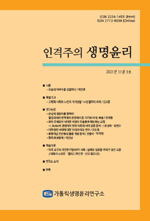연명의료결정법 대상 환자의 연명의료결정과 사망 전 의료이용에의 영향요인
Factors Influencing Life-Sustaining Treatment Decision and the Healthcare Utilization before Death for Patients
- 가톨릭생명윤리연구소
- 인격주의 생명윤리
- 14권 1호
-
2024.0135 - 68 (34 pages)
-
DOI : 10.35230/pb.2024.14.1.35
- 123

본 연구는 연명의료결정법 대상 환자의 연명의료결정과 사망 전 의료 이용에 미치는 영향요인을 파악하기 위한 후향적 코호트 연구로, 1,072명 환자를 대상으로 다중 로지스틱 회귀 분석을 실시하였다. 연구결과 연명의료 자기결정군이 가장 많았으며(49.4%), 암질환자가 92.8%였다. 사망 일주일 전 의료이용은 수혈이 49.2%로 가장 많았다. 연명의료 자기결정군에서 가족결정군과 DNR 작성군에 비해 일평균 의료비용이 적었고, 호스피스 이용이 많았으며, 연명의료계획서 작성 일수가 길었다. 입원 시 의식 수준이 명료할 때보다 혼미한 경우 연명의료자기결정군보다 가족결정군이 36.225배, DNR 작성군이 19.422배 높았고, 중환자실 이용은 가족결정군이 3.627배, DNR 작성군이 4.137배 높았으며, 인공호흡기 적용은 가족결정군이 2.372배, DNR 작성군이 4.209배 높았고, 심폐소생술은 DNR 작성군에서 9.122배 높았다. 본 연구결과를 통해 연명의료 자기결정이 사망 전 무익한 의료이용을 줄이고 호스피스 이용을 높일 수 있음을 확인하였기에 환자가 연명의료를 포함한 생애말기 돌봄계획 수립을 할 수 있도록 지원하는 것이 필요할 것이다.
This study embarks on a detailed cohort analysis to identify the factors influencing life-sustaining treatment (LST) decisions and healthcare usage before death. Utilizing multinomial logistic regression, it examines a diverse sample of 1,072 patients, categorized into three groups: self-determination, family determination, and DNR. The majority of the cohort, 49.4%, falls under the self-determination group, with a significant proportion of patients (92.8%) suffering from cancer. We find that the most common medical intervention in the week preceding death was blood transfusions, accounting for 49.2% of cases. The study reveals that the self-determination group experienced lower daily healthcare costs, higher hospice utilization rates, and longer intervals between physician orders for life-sustaining treatment(POLST) or DNR completion and death, compared to the other groups. Moreover, patients with stupor on admission were significantly more likely to be in the family determination group (36.225 times) or the DNR group (19.422 times) than in the self-determination group. Furthermore, the likelihood of ICU use was higher in the family determination (3.627 times) and DNR groups (4.137 times), with the application of mechanical ventilation being 2.372 times more common in the family determination group and 4.209 times in the DNR group. Lastly, cardiopulmonary resuscitation was 9.122 times more prevalent in the DNR group compared to the self-determination group. The study concludes that self-determination in LST can significantly reduce unnecessary healthcare utilization before death and promote hospice care utilization, underscoring the necessity of supporting patients in planning their end-of-life care, including decisions about LST.
Ⅰ. 서론
Ⅱ. 본론
Ⅲ. 논의
Ⅵ. 결론 및 제언
(0)
(0)